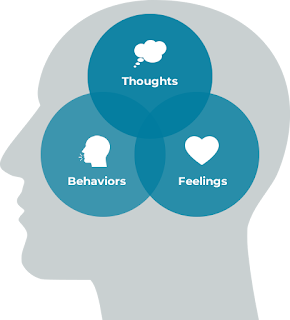Cognitive Behaviour Therapy
Cognitive Behavior Therapy (CBT) seeks to alter negative thoughts and behaviors. It is frequently employed as an effective form of treatment for anxiety and depression.
CBT employs various techniques to help
change your thoughts and behavior, such as assessment, goal setting and
practicing new strategies.
Cognitive behaviour therapy (CBT) is a form of psychotherapy that aims to change negative
thoughts and behaviours. It is often used to treat anxiety and depression.
Cognitive Behavior Therapy (CBT) is an
approach used in psychotherapy that seeks to change negative thinking and behaviors,
often to treat anxiety or depression.
Therapy sessions usually consist of
multiple meetings between you and the therapist in which they collaborate on
understanding the causes and solutions to your difficulties, while providing
homework to reinforce what has been learnt and foster new skills development.
One technique in CBT involves keeping a
journal of your thoughts and emotions so you can identify which are true, then
replace them with healthier ideas or feelings.
Finding a therapist you feel at ease with
is crucial, as is finding one who understands mental health concerns. Be
prepared to put forth effort into attending each session - you won't get much
out of them otherwise!
It is a time-limited form of therapy
CBT is a short-term therapy method used to
develop coping skills. It may be beneficial in treating anxiety, depression,
bipolar disorder and panic disorder symptoms.
Cognitive Behavior Therapy aims to identify
negative thought patterns and replace them with more constructive ones, while
simultaneously developing and practicing new coping strategies between
sessions.
At the outset of therapy, your therapist
will discuss your goals and concerns, asking about thoughts and emotions as
well as behaviors which don't seem to work. They may ask you to write down
anything relevant that has surfaced for consideration by both parties involved.
Your therapist will discuss these with you
and together devise a plan to change your thoughts and behavior patterns,
including any necessary coping strategies you might implement at home or
elsewhere in life.
It is effective in treating a wide range of disorders
Cognitive Behavior Therapy (CBT) is one of
the most successful psychotherapies for treating a range of mental health
conditions. CBT focuses on changing negative thoughts and behaviours to achieve
lasting change; studies have proven its success at treating anxiety,
depression, panic disorder, post-traumatic stress disorder and substance use
disorders.
CBT is a time-limited form of therapy consisting
of 5-20 sessions that typically takes place one-on-one.
Your therapist will begin by developing an
understanding of your specific issue. They may discuss symptoms and challenges
you are currently facing as well as goals you wish to set for therapy sessions.
Next, they will assess your current
thoughts, beliefs and emotions and will identify which are inaccurate or
counter-productive and cause you issues.
They will then look for ways to challenge
these thoughts and behaviors, replacing them with healthier thinking and
behavior patterns for optimal wellbeing and more positive life experiences. You
will also gain new skills for dealing with challenging situations during
therapy.
It is not suitable for everyone
Although cognitive behavior therapy (CBT)
can bring numerous benefits, not everyone may be suitable. This is especially
true for those experiencing complex mental health conditions - for instance
those living with learning disabilities or experiencing severe bouts of anxiety
might not be good candidates. Furthermore, its cost may make a visit
prohibitive.
An effective CBT session requires the
combination of high-level thinking skills and practical strategies for dealing
with stressors associated with mental illness. To make the most out of your
sessions, find a therapist with whom you feel comfortable who understands your
specific circumstances and challenges; finding this person could make all the
difference! The key is simply starting; at minimum you may require at least
five sessions, although up to 20 is the recommended maximum number.



Comments
Post a Comment